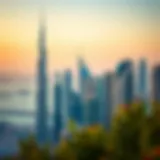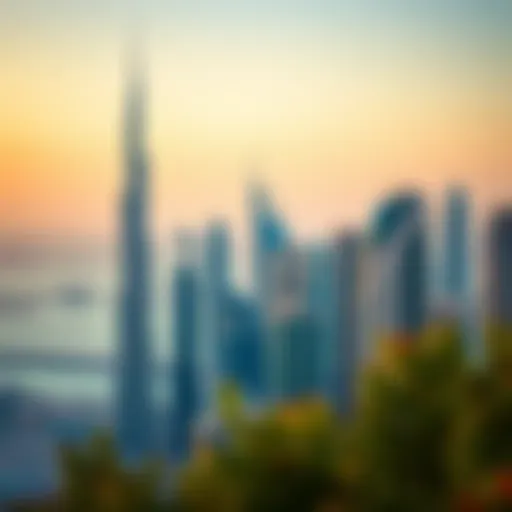Comparative Insights on Dubai and Sharjah's Real Estate
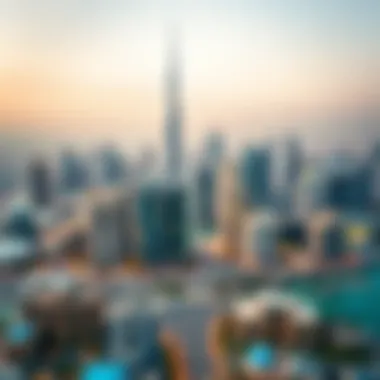

Intro
Navigating the vast landscapes of Dubai and Sharjah can illuminate not just the geographical differences between these two emirates but also their rich cultural fabric and thriving real estate markets. With every towering skyscraper that punctuates Dubai's skyline, there lies a fascinating contrast in the quieter, more traditional allure of Sharjah. This guide aims to unravel the complex tapestry of these regions, showcasing their unique identities—each with its own allure for investors, expatriates, and residents.
Dubai is often recognized as a beacon of modernity, a global city known for its luxury and opulence, while Sharjah has managed to preserve its cultural essence, drawing attention for its family-friendly atmosphere and vibrant arts scene. Understanding the spaces each emirate offers is crucial for anyone contemplating investment or relocation within the UAE. What opportunities exist? How does one navigate the variable landscape of potential? These questions merit exploration.
As we delve deeper, we will cover the latest market trends, analyze the neighborhoods on the rise, and take a closer look at the types of properties that are currently gaining traction. By the end of this journey, you will have a well-rounded grasp of where to stake your claim in this dynamic real estate market. Let’s take the plunge and discover what awaits in Dubai and Sharjah.
Market Trends and Analysis
Current Market Overview
The real estate market in Dubai and Sharjah serves distinct demographics and development goals. Dubai's landscape is dominated by high-end living and extravagant skyscrapers like the Burj Khalifa. In contrast, Sharjah offers a more modest approach, catering primarily to families and cultural enthusiasts with its heritage sites and community-focused developments.
As of recent reports, Dubai has seen a significant demand for off-plan properties, translating into increased investor confidence. Hot areas include Dubai Hills Estate and the further expansion of Dubai Marina. The consistent influx of tourists and expatriates continues to fuel demand, contributing to a robust short-term rental market.
Meanwhile, Sharjah's property market has taken a different turn. The demand for affordable housing continues to rise. Communities like Aljada are transforming the residential landscape, offering both quality and afforablity.
Future Market Predictions
Based on current trends, it's anticipated that Dubai will maintain its position as a global hub for luxury real estate, with steady investment from foreign markets. However, the saturation of high-end developments may push new investors towards more diverse assets, including mid-range residential properties. Meanwhile, Sharjah is expected to capitalize on affordable housing segments, supporting families looking to settle long-term.
“Both emirates offer unique opportunities, catering to different tastes and financial capabilities. The wise investor knows where to look.”
In summary, while Dubai may sip on the cocktail of luxury, Sharjah embraces the richness of culture and affordability. Understanding these differences not only makes smart investment sense but sets the stage for a deeper appreciation of their characteristics.
Investment Opportunities
Emerging Neighborhoods
Within Dubai, areas like Mohammed Bin Rashid City and Dubai South are betting on future potential, becoming magnets for both investors and new residents. On the flip side, Sharjah’s Aljada and Al Muwaihat are emerging as community-centric neighborhoods, steadily gaining popularity.
Key Highlights:
- Dubai:
- Sharjah:
- Mohammed Bin Rashid City: A future hub for commercial and leisure activities.
- Dubai South: Designed to host Expo 2020 and beyond, featuring a mix of residential and commercial properties.
- Aljada: Integrated development with a strong focus on lifestyle and cultural amenities.
- Al Muwaihat: Family-friendly area known for green spaces and schools.
Types of Properties for Investment
Investors are presented with distinct choices in each emirate. In Dubai, luxury apartments, off-plan villas, and commercial properties dominate. Sharjah, on the other hand, offers affordable apartments and townhouses.
Property Types Comparison:
- Dubai:
- Sharjah:
- High-end apartments in Downtown or Dubai Marina.
- Off-plan villas in upcoming communities.
- Commercial real estate like retail spaces and offices.
- Affordable apartments in new developing areas.
- Townhouses that cater to family needs.
- Mixed-use developments that incorporate living, shopping, and recreation.
Geographical Overview of Dubai
Understanding the geographical setup of Dubai is essential, as this backdrop informs much of its vibrant culture, economic strategies, and urban planning. The distinct characteristics of Dubai's geography play a crucial role in defining its allure for investors and residents alike. This section provides a comprehensive look at the key characteristics that differentiate Dubai from other locations, providing insights into its rapidly evolving urban landscape and how it accommodates diverse populations and industries.
Location and Size
Dubai is nestled on the southeastern coast of the Arabian Peninsula, within the Arab world and more specifically in the Persian Gulf region. Covering an area of approximately 4,114 square kilometers, it ranks as the second largest emirate in the UAE, following Abu Dhabi. Its strategic location allows Dubai to act as a major international trade hub, connecting the East and West. The assumption of being a mere desert city is misleading; Dubai's position facilitates not just the inflow of tourists but also the intricate dance of global commerce. Whether one is engaging in leisure or business, being in a city so well-placed is incredibly beneficial.
Topography and Climate
The topography of Dubai is a mixture of sandy deserts and coastal areas, punctuated by the striking silhouette of skyscrapers. While its renowned Burj Khalifa pierces the sky, the surrounding desert stretches endlessly, presenting a stark yet beautiful contrast. The climate features a desert pattern with painfully hot summers and mild winters. Temperatures can easily soar to 45°C in the peak of summer, often leading to discussions around outdoor activities and the merits of air conditioning in everyday life. This weather pattern significantly impacts architectural decisions, agriculture, and the overall lifestyle of the inhabitants.
Urban Layout and Infrastructure
Dubai's urban layout is a masterclass in planning, with sprawling neighborhoods housing a wealth of cultural and commercial districts. The city is designed to provide a seamless experience for both residents and tourists, which is apparent in the connectivity offered by an efficient public transportation system comprising the Dubai Metro, buses, and trams. Highways such as Sheikh Zayed Road crisscross the city, making commuting and transportation remarkably straightforward. Notably, the futuristic Dubai Marina offers luxurious waterfront living, giving it a distinctive edge. With the ongoing expansion projects, including the Mohammed bin Rashid City, the infrastructure landscape is set for continuous growth, proving that Dubai is not just a place but a vision in the making.
The evolution of Dubai's urban layout reflects an ambitious drive to remain at the forefront of modernity and innovation, making it an attractive option for discerning investors and homeowners alike.
Overall, the geographical attributes of Dubai serve as a framework for understanding its complex economic structure and social fabric.
Geographical Overview of Sharjah
Understanding the geographical landscape of Sharjah is crucial for those looking to invest or relocate to the region. Sharjah, known for its rich cultural heritage, offers a blend of modernity and tradition that attracts expatriates and investors alike. Its location and urban framework play vital roles in shaping its economic landscape and lifestyle offerings. Here we delve into essential aspects of this dynamic emirate.
Location and Size
Sharjah is the third-largest emirate in the United Arab Emirates, spanning an area of approximately 2,590 square kilometers. Nestled along the coast of the Arabian Gulf and bordered by Dubai to the south, its strategic location contributes significantly to its economic growth and connectivity. The emirate’s position makes it a hub for trade routes, allowing easy access for logistics and commerce.
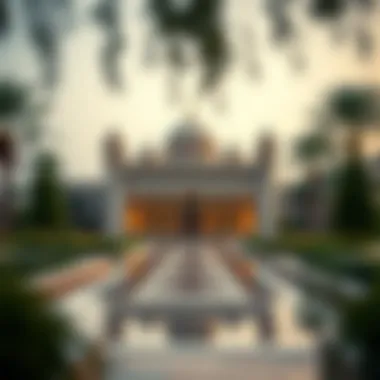

It's worth noting how its participation in various trade agreements enhances Sharjah’s appeal for investors. Proximity to Dubai, one of the world’s most significant business centers, further reinforces its image as a preferred location for businesses seeking a foothold in the region. The blend of urban developments and natural landscapes offers a unique charm. To put it plainly, Sharjah strikes a fine balance between enjoying the bustling urban life while remaining connected to the scenic beauty of the Gulf.
Topography and Climate
The topography of Sharjah showcases a diverse range of landscapes. From its coastal areas characterized by sandy beaches to the inland deserts featuring rocky plateaus and green oases, the emirate presents a captivating tableau for both residents and tourists. An interesting aspect is the Hajar mountains, which can be found in the eastern parts—adding a dramatic touch to the otherwise flat terrain.
When it comes to climate, Sharjah experiences a desert climate with scorching summers and mild winters. Temperatures can soar above 40 degrees Celsius during the peak summer months from June to August, which can be quite challenging for those unaccustomed to such heat. However, the winter months, from December to March, offer a welcome respite with average temperatures ranging from 18 to 25 degrees Celsius. The humid coastal air can also influence temperatures, particularly in summer, making it a point of consideration for potential residents.
"The geographical and climate attributes of Sharjah make it a continually evolving emirate, ripe with opportunities for potential investors looking to tap into emerging markets."
Urban Layout and Infrastructure
Sharjah's urban layout reflects a mix of traditional and contemporary design, creating a distinct identity. The central area, with landmarks like the Sharjah Arts Museum and Al Qasba, exudes cultural richness. Development projects like Aljada are reshaping the urban landscape and drawing attention with their blend of residential, commercial, and recreational spaces.
The emirate has made substantial investments in infrastructure, boosting connectivity through a well-structured road network. Upgrades to public transportation, including buses and the introduction of cycle lanes, show a commitment to sustainable living. This progress is vital for enhancing the overall quality of life for residents. Furthermore, the availability of essential amenities, including schools, hospitals, and retail centers, supports a growing population and enhances the attractiveness of Sharjah as a living and investment destination.
Economic Landscape of Dubai
The economic landscape of Dubai is a critical focal point in understanding the overall dynamics of the Emirate. Its robust economy serves not only local businesses but also attracts global investors looking for opportunities in a rapidly evolving market. The interplay between various economic sectors is what makes Dubai a forerunner in the region. This section highlights the essence of this economic framework, touching on real estate trends, investment opportunities, and the impact of tourism, which are all intertwined to create a unique economic ecosystem.
Real Estate Market Trends
The real estate market in Dubai is often described as a barometer of economic health. This dynamic sector showcases a blend of luxury developments and accessible housing, catering to a wide range of demographics. In recent years, buyers have noticed an increase in mid-range housing options, pushing prices into a more approachable territory for first-time buyers.
Dubai's housing market has become particularly attractive due to various factors:
- A high return on investment (ROI): Properties here, especially in prime locations, can yield significant rental income. Investors often see ROI numbers that outperform many Western markets.
- Government incentives: Reforms in property ownership laws, particularly easing restrictions for expatriates, are encouraging new investments.
- Diversification: Areas outside of high-profile regions like Dubai Marina or Downtown are starting to bloom, leading to hidden gems that promise potential growth for investors willing to do their homework.
Investment Opportunities
Investment opportunities in Dubai extend beyond just real estate, reaching into various sectors including technology, finance, and healthcare. Notably, the Dubai Multi Commodities Centre (DMCC) has positioned itself as a global hub for trade and investment, offering compelling reasons for businesses in specific niches to establish their base here.
Furthermore, the emirate's forward-thinking approach to economic development has led to:
- A taxation system that benefits investors: With no income tax and various free zones, Dubai creates an attractive environment for foreign enterprises.
- Support for innovation and startups: Initiatives from the Dubai government have empowered entrepreneurs, making it easier for startups in tech to flourish, like the Dubai Internet City and Dubai Silicon Oasis.
- Real estate investment trusts (REITs): With the introduction of REITs, the market allows smaller investors to participate in real estate markets without purchasing entire properties outright.
Impact of Tourism Industry
Tourism is another pillar of Dubai’s economic landscape and cannot be overlooked. The recent push to elevate the tourism sector has significantly influenced the economy, driving demand in real estate and related industries. Dubai's tourism initiatives have led to:
- Increased hotel developments: The surge in tourists has spurred a boom in hotel constructions, with luxury experiences and budget options alike.
- Major global events: Hosting international expos and conferences increases visibility, attracting even more visitors and businesses. The Expo 2020 Dubai, although delayed, symbolized this impact, proving that strategic events can boost the economy.
- Cultural tourism: An emphasis on cultural experiences has started bringing in travelers looking for more than just luxurious stays; they want authentic experiences, which encourages investment in cultural sites and museums.
The economic vitality of Dubai is a testament to its strategic thinking and adaptability in an ever-evolving landscape.
As investors and residents explore opportunities in Dubai, the intricate interconnections between real estate trends, investment possibilities, and tourism underline why this emirate stands as a key player on the global economic stage.
For more information regarding the economic framework of Dubai, check out resources such as Dubai Economic Department or Dubai Tourism.
For a more detailed study, you can refer to articles on Wikipedia and Britannica.
Economic Landscape of Sharjah
The economic landscape of Sharjah stands as a compelling framework showcasing the emirate's resilience and growth. As a vital part of the United Arab Emirates, Sharjah offers a contrast to its flashier neighbor, Dubai. While Dubai is known for its luxurious lifestyle and skyscrapers, Sharjah presents a more traditional yet thriving economic environment. The focus here is on the interdependence of various sectors, including real estate, investments, and tourism; they all contribute to making Sharjah a unique player in the region.
Real Estate Market Trends
Sharjah's real estate market has experienced notable growth in recent years, driven by a combination of affordable housing and comprehensive urban planning. Unlike Dubai, where the property prices can soar to daunting heights, Sharjah's market is more accessible, appealing to a diverse demographic, including expatriates and local families.
Recent trends indicate increasing interest from investors in residential and commercial properties.
- The average price per square meter is significantly lower compared to Dubai, enticing buyers looking for returned value without the hassle of excessive costs.
- Projects like Aljada and the Sharjah Waterfront City highlight the emirate's commitment to modern living infused with cultural richness.
- Additionally, the completion of the Sharjah International Airport development brings forth further potential in the residential and commercial sectors.
This wave of development has not only advanced the real estate market but also contributed to a stronger economic infrastructure, allowing for a more balanced lifestyle alongside work opportunities.
Investment Opportunities
Investors eyeing opportunities in Sharjah should note the emirate's diverse sectors, which are supportive of a growing economy. The recent amendments to laws facilitating foreign ownership are a game-changer.
"Entering the Sharjah market offers favorable conditions that encourage growth and sustainability. Investors can benefit from a stable fiscal environment alongside supportive government policies."
Notable avenues for investment include:
- Industrial Sector: Sharjah's strategic location makes it a hub for manufacturing and logistics.
- Education and Healthcare: With substantial ongoing projects in university and hospital construction, the demand for educational and health services is at an all-time high.
- Cultural Investments: Reflecting a deep cultural heritage, elements like museums and art hubs offer unique opportunities.
Overall, the investment landscape here provides a mix of traditional and modern elements, making it attractive for both local and foreign investors looking to engage in substantial development.
Impact of Tourism Industry
The tourism sector in Sharjah acts as another pillar of its economy, distinct from the high-roller lifestyle seen in Dubai. Sharjah prides itself on being the Islamic Culture Capital and a UNESCO World Book Capital, which draws visitors seeking cultural and historical experiences.


The emirate caters to around 2 million visitors per year. Reasons behind this influx include:
- Cultural Festivals and Events: Events like the Sharjah Heritage Days or the Sharjah Book Fair attract crowds, emphasizing local traditions while celebrating literary culture.
- Family-Friendly Activities: With attractions such as Al Noor Island and the Sharjah Aquarium, it presents a wholesome experience for families, distinguishing it from pure entertainment-focused tourism seen in Dubai.
As tourism continues to grow, it generates further opportunities in ancillary businesses, such as hospitality and entertainment, playing an essential role in shaping Sharjah's economic landscape. The approach taken by Sharjah to balance modern-day tourism with cultural integrity enriches its economic prospects significantly.
Lifestyle Considerations in Dubai
Understanding the lifestyle factors in Dubai is pivotal for anyone contemplating a move or investment in the Emirate. Dubai, a bustling hub, offers a unique blend of modernity and tradition, influencing daily life in various ways. From cultural dynamics that shape social interactions to residents' preferences in choosing the right neighborhood, these aspects are crucial for potential residents and investors alike.
Cultural Dynamics
Dubai is a melting pot of cultures, brought together by the many nationalities that inhabit the city. This diversity isn't just a statistic; it greatly impacts social life and community involvement. The Emirate hosts numerous cultural festivals, art exhibitions, and culinary celebrations that celebrate different backgrounds. For instance, events like Art Dubai or the Dubai Food Festival offer a taste of global cultures intermixed with local traditions.
Community gatherings, both formal and informal, form the backbone of social life here. You could witness groups sharing meals during Ramadan, engaging in discussions about Arabian literature, or attending performances of traditional dance. The multicultural environment fosters open-mindedness, making it easier for newcomers to adapt.
Key Points on Cultural Integration:
- Community Events: Engaging in local festivities can provide great opportunities for networking.
- Cultural Respect: Non-native residents often express amazement at the hospitality shown by Emiratis toward foreign locals, paving the way for mutual respect and understanding.
- Language Diversity: While Arabic is the official language, English dominates business and social discourse, facilitating smoother communication.
Residential Communities
Choosing the right community is one of the most significant lifestyle decisions for anyone moving to Dubai. The landscape presents a variety of housing options, from lavish villas in Emirates Hills all the way to modern apartments in Dubai Marina. Each area boasts its unique vibe, suited for different lifestyles.
For example, young professionals may find Jumeirah Lakes Towers appealing due to its proximity to commercial hubs, while families might lean towards quieter areas such as Arabian Ranches, which offer community-oriented amenities.
Popular Residential Choices:
- Downtown Dubai: Known for its iconic Burj Khalifa, it’s a hub for luxury and entertainment.
- Dubai Silicon Oasis: Targets tech enthusiasts and families, offering affordable housing options.
- Mirdif: A residential area that appeals to expatriates, known for spacious properties and community facilities.
In assessing where to live, consider factors such as proximity to work, school availability, and leisure facilities. This can make life in Dubai more manageable and enjoyable.
Amenities and Services
Every corner of Dubai is equipped with exceptional amenities and services catered to meet the varied needs of its residents. Whether it’s shopping in glamorous malls like The Dubai Mall, accessing world-class healthcare facilities, or enjoying vast recreational spaces, the Emirate leaves no stone unturned.
- Shopping: From traditional souks to high-end boutiques, shopping is more than just a necessity – it’s an experience.
- Health Services: Premium health facilities such as Mediclinic and American Hospital provide excellent medical care, assuring residents of their well-being.
- Education: International schools cater to various curricula, offering options like the British or American system, making sure your child receives quality education.
- Connectivity: The public transport system, notably the Dubai Metro, is efficient and connects many key areas seamlessly.
Lifestyle Considerations in Sharjah
Understanding lifestyle in Sharjah is essential for those looking to invest or simply immerse themselves into its unique culture. This emirate is not just about stunning architecture or economic prospects; it also offers a lifestyle that reflects a blend of tradition and modernity. Sharjah prides itself on its commitment to preserving culture while providing a harmonious living environment.
Cultural Dynamics
Sharjah is often considered the cultural capitol of the UAE. The emirate's dedication to the arts and heritage is evident in its various museums, galleries, and cultural festivals. For instance, the Sharjah Biennial attracts artists from around the globe, further establishing the emirate as a hotspot for creative minds.
Moreover, Sharjah’s commitment to Arabic culture means that residents will find a palpable sense of identity rooted in its traditional values. There is a strong emphasis on family and community, which reflects in daily life. The various cultural events and programs are not just for show; they serve to enrich a sense of belonging among residents. An evening stroll along the Corniche, surrounded by artwork and displays of local craftsmanship, reinforces this connection to culture.
Residential Communities
Residential areas in Sharjah vary widely, appealing to different tastes and budgets. Neighborhoods like Al Majaz and Al Nahda are well-known for their modern amenities, featuring shopping centers, parks, and schools. These areas typically have a more cosmopolitan feel, attracting expatriates and young professionals.
Conversely, communities like Al Gulaya’a or the older parts of the city offer a more traditional lifestyle, with a focus on family and close-knit living. Families often prefer these neighborhoods due to the availability of local markets and friendly neighbors.
When considering the housing market, options range from luxurious apartments to spacious villas. This variety allows for personal choices based on lifestyle needs. The tranquil atmosphere, in conjunction with family-friendly activities in local parks, marks Sharjah as an attractive option for those looking for a community-oriented lifestyle.
Amenities and Services
Sharjah may not have the glitz of Dubai, but it compensates with its own set of solid amenities and services. You will find the standard offerings like hospitals, schools, and recreational facilities, but the quality often exceeds expectations.
For instance, Al Qasba offers a vibrant blend of dining options and entertainment spots. Residents can indulge in an exhilarating day at the Sharjah Aquarium or enjoy a leisurely evening at the Sharjah Arts Centre.
Furthermore, the emirate prides itself on accessibility. With robust public transport and a focus on walkability, most amenities are a short distance away, which is a big plus for families. Having all these services just around the corner can foster a tight-knit community feeling while making daily life seamless.
"In Sharjah, one finds a balance between modern living and traditional values, creating a unique fabric that appeals to a diverse population."
In summary, Sharjah offers a multifaceted lifestyle that intertwines cultural richness with practicality. Understanding these elements is crucial not only for potential residents but also for investors seeking a deeper insight into the community they are entering.
Regulatory Environment of Dubai
The regulatory environment in Dubai is critical for any analysis concerning real estate and investment potential. It lays down the framework within which both local and foreign investors operate. The laws governing property ownership, leasing, and development significantly affect market dynamics and investor confidence. Dubai's ambitions, evident through the emirate's burgeoning skyline and progressive initiatives, have spurred the creation of a robust set of regulations that govern its real estate sector. With a mix of modernity and innovation, the regulations not only foster growth but also maintain balance, ensuring protection for all stakeholders.
This backdrop serves as an essential consideration for potential investors who seek assurance and stability in an otherwise unpredictable marketplace. The following two subsections will provide further insights into the specific legal frameworks shaping Dubai's property landscape.
Property Ownership Laws
Dubai's property ownership laws are designed to facilitate foreign investment while ensuring a level of local protection. The introduction of freehold property ownership in specific areas of Dubai has been a game-changer, allowing expatriates to buy properties with full ownership rights. Such laws have unlocked opportunities that were previously unattainable, effectively drawing in a diverse investor pool ranging from individuals to corporate entities.
However, one must tread carefully. While many areas permit 100% foreign ownership, some still adhere to local ownership stipulations. Therefore, potential buyers should arm themselves with information and possibly legal counsel to navigate these nuances adeptly.
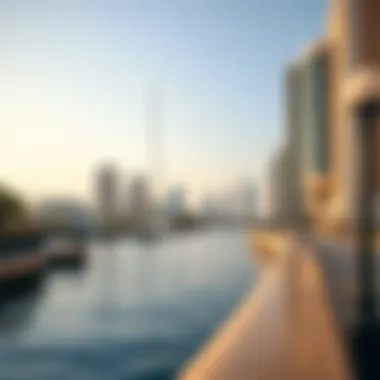

Here are some crucial aspects of property ownership laws:
- Freehold vs. Leasehold: Most expatriates can only own properties on a freehold basis in designated areas. Leasehold agreements, however, typically grant rights to property for a period of up to 99 years.
- Securities and Fees: Buyers must also consider associated fees such as registration costs, transfer fees, and, in some cases, service charges that accompany property ownership.
- Usage Guidelines: Investors must abide by zoning laws that specify the property’s intended use, ranging from residential to commercial uses.
"Understanding these factors lays the groundwork for a fruitful real estate investment journey in Dubai."
Real Estate Regulations
The real estate regulations in Dubai play a pivotal role in maintaining a structured environment that promotes compliance and integrity in transactions. These regulations encompass a broad spectrum of elements including transaction processes, building codes, and tenant rights. The Dubai Land Department (DLD) is a key player, working diligently to ensure transparency and facilitate smooth dealings within the property market.
Important components of real estate regulations include:
- Registration Requirements: All real estate transactions must be registered with the DLD, reinforcing transparency and legal validity.
- Tenancy Laws: The Rental Dispute Center aims to resolve conflicts while ensuring the rights of both landlords and tenants are preserved. Again, knowledge of local tenancy laws is crucial for maintaining fairness and avoiding disputes.
- Building Codes and Safety Standards: Adhering to established building codes helps ensure safety and sustainability in construction projects. Inspections are rigorously conducted to uphold these standards.
In summary, the regulatory environment in Dubai lays a solid foundation for its real estate market. With increasing international involvement, understanding these laws and regulations is vital for making informed decisions. Investors who comprehend these aspects are better poised to navigate the market's complexities successfully.
Regulatory Environment of Sharjah
The regulatory environment in Sharjah holds significant weight, especially for those looking into the real estate sector or considering residency in this emirate. The nuances of regulations can make or break investment decisions. Sharjah's laws are crafted to ensure safety and provide clarity, while also encouraging growth. Understanding these regulations is crucial for investors, homeowners, expatriates, agents, and analysts alike.
Property Ownership Laws
Sharjah's property ownership laws present a complex tapestry of rights and obligations. Unlike Dubai, where foreign ownership options are more widely accessible, Sharjah has specific rules that might restrict ownership to certain areas or to UAE nationals in general. However, expatriates can enjoy ownership in designated freehold areas, such as Al Buheirah or Al Khan. These zones are crafted to accommodate the growing expat community and encourage investment while remaining sensitive to the local populace in less commercially developed regions.
Investors planning to buy property in Sharjah should consider the following:
- Leasehold vs. Freehold: Understanding whether the property falls under leasehold or freehold ownership is essential as it defines the type of investment and the duration of rights over the property.
- Documentation and Registration: The process requires meticulous documentation. The property must be registered with the Sharjah Municipality, ensuring legal recognition.
- Government Policies: Stay updated on changes as the Sharjah government has been known to adjust policies to attract foreign investment. Recent years have seen several efforts to simplify the process and increase transparency.
"In today's landscape, understanding the laws governing property is half the battle won for any investor in Sharjah."
Real Estate Regulations
The real estate regulations in Sharjah are designed to create a fair and sustainable market while addressing concerns of all stakeholders involved. Regulations encompass various facets, from construction laws and permits to property management and tenant rights, ensuring a balanced approach for both landlords and tenants.
Key aspects of real estate regulations include:
- Building Codes and Standards: Adhering to specific building codes promotes safety and sustainability. Builders and developers are expected to comply with local requirements, ensuring that structures are not only aesthetically pleasing but also safe and functional.
- Tenancy Laws: Regulations cover the rights of tenants and landlords, facilitating harmonious living conditions while safeguarding investments. These laws outline terms of leases, eviction processes, and dispute resolutions, promoting a fair marketplace.
- Regulatory Bodies: Entities such as the Sharjah Real Estate Registration Department oversee compliance and implementation of these laws, ensuring smooth operations and offering guidance to newcomers.
As the Emirate evolves, so too do the expectations from its regulatory framework. Staying informed about these updates is vital for anyone looking to delve into Sharjah's real estate scene.
Comparative Analysis between Dubai and Sharjah
The contrasting characteristics between Dubai and Sharjah serve as a canvas to understand the unique dynamics of the UAE. This section examines what sets the two emirates apart, specifically focusing on market trends, residential appeal, pricing structures, and future predictions. By analyzing these dimensions, investors and potential homeowners can make informed choices that align with their long-term goals and lifestyle preferences.
Key Differences in Market Trends
When diving deep into the market trends within Dubai and Sharjah, the discrepancies are unmistakably apparent. Dubai, known as the glitzy jewel of the UAE, generally presents a more vibrant real estate sector, attracting significant foreign investment. The sheer scale of projects like the Burj Khalifa and the Palm Jumeirah exemplifies its ambition and capacity for innovation.
In contrast, Sharjah holds its ground with a more conservative and family-oriented market. Investors looking here often find lower property prices and a slower, steadier approach to development. The primary market drivers in Sharjah come from locals and expatriates preferring a quieter lifestyle, often valuing affordability without compromising quality.
- Dubai: Popular for luxury and high-rise living, attracting wealthy buyers.
- Sharjah: Appeals to family units, aimed at functionality and cost-effectiveness.
A key takeaway from this analysis is how buyer demographics influence pricing and investment strategies. Investors leaning towards high-return models may favor Dubai, while those aiming for sustainability might find Sharjah's market appealing.
Residential Appeal and Pricing
Residential environments in both emirates exhibit distinct identities. Dubai offers an eclectic mix, from luxurious villas in Arabian Ranches to contemporary apartments in Downtown. The accessibility of world-class amenities elevates its appeal but often comes with a steep price, where high-end living doesn't come cheap. However, for a discerning investor, the luxury market in Dubai still promises potential currency appreciation.
On the other hand, Sharjah’s residential spaces tend to be characterized by more modest developments, predominantly catering to families. Prices here are generally more palatable, with substantial properties available at competitive rates. Local schools, parks, and cultural centers contribute to its attractiveness. House hunters looking for a comfortable lifestyle without the exhausting price tag will find Sharjah particularly inviting.
- Dubai: Pricey but promises significant returns and a lavish lifestyle.
- Sharjah: Economical options with a focus on community living.
The divide in residential appeal primarily focuses on lifestyle choices—where opulence meets practicality.
Future Market Predictions
Looking ahead, market predictions for both Dubai and Sharjah suggest differing trajectories. Dubai’s robust infrastructure advancements and continuous influx of expatriates indicate a steady growth pattern. Event-driven initiatives, like Expo 2020 (which extended into 2021), will likely catalyze more foreign investment, pushing property prices upward.
In contrast, Sharjah might not experience the same kind of explosive growth, but its consistent demand for family-friendly living spaces hints at gradual and sustainable appreciation in real estate values. With its recognized dedication to arts and culture, the emirate is quietly cementing its future as a desirable residence for middle-income families.
“Investors should approach the future with eyes wide open, where Dubai dazzles with prospects, while Sharjah offers roots.”
In sum, while Dubai shines bright with opportunities for high-stakes investment, Sharjah serves as an anchor—reliable, resilient, and offering a balance to those not in the race for the flashiest market. All in all, knowledge of these trends can greatly benefit both residential choices and investment decisions.
End
The examination of Dubai and Sharjah serves as a crucial element in understanding their distinct yet interconnected landscapes. Both emirates offer unique opportunities and challenges that cater to a variety of investors, homeowners, and expatriates. The detailed exploration into their geographical, cultural, and economic aspects reveals not only the vibrancy of these two regions but also the potential for future growth and investment.
Key Takeaways
- Geographical Diversity: Dubai features a skyline dominated by modern architecture while Sharjah boasts cultural heritage and traditional aesthetics. This contrast highlights different approaches to urban planning and development.
- Economic Opportunities: Both emirates are flourishing economically, with Dubai leading in tourism and Sharjah focusing on affordable real estate and educational investments.
- Cultural Dynamics: Understanding the cultural differences is vital for anyone looking to relocate or invest. Dubai is often seen as cosmopolitan, while Sharjah retains a more conservative and family-friendly atmosphere.
- Regulatory Framework: The regulations around property ownership and investment are distinct in both regions, thus making it essential for investors to understand these laws before making decisions.
Final Thoughts on Investment Potential
Investing in either Dubai or Sharjah opens a plethora of avenues, yet it necessitates careful consideration of each emirate's unique characteristics. Dubai's international appeal and rapid growth present lucrative opportunities, especially in luxury real estate and commercial ventures. In contrast, Sharjah's focus on cultural preservation and affordability offers a refreshing alternative for families and investors seeking long-term value without the high stakes often associated with Dubai.
In summary, the smart investor must weigh these factors while making informed decisions. The potentials are vast, but aligning with the right emirate's ethos and market dynamics is crucial. Whether you are looking for a vibrant lifestyle, substantial returns, or a serene environment, Dubai and Sharjah each has something unique to offer.




